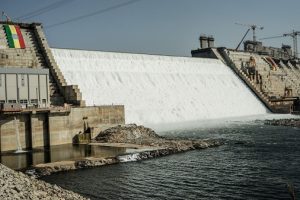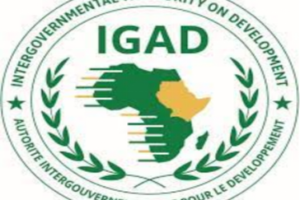Ethiopia’s as well as Africa’s renaissance is around the corner. Ethiopia, which is home to over 110 million people, is capable of being the major power in the Horn of Africa. It has shown remarkable changes in all aspects especially after the recent freeform amid a range of daunting set of challenges predominantly emanating from the deep rooted ethnocentric and religious sabotage formulated by the previous regime.
How confident the Ethiopian Prime Minister is to wholeheartedly utter that Ethiopian renaissance, peace and prosperity are going to be hit whether we like or not. The main thing is to be part of this momentous juncture. As we think and speak of, I cordially urge all to pass memorable and lucrative legacy to the next generation especially in planting tree seedlings.
The above expression is a touchy and influential as it is of paramount importance in motivating all Ethiopians at home and abroad to make synergy and be committed than ever before to push this strategic east African nation steps forward. Ethiopia is a key prize in the journey for influence and power in the Horn of Africa and broader Red Sea region. Inevitably, it can become an African power as its natural resources, population of 110 million, and well-equipped military are really ample weapons to defeat poverty and backwardness.
The whole world has comprehended that the country is one of the few African nations never to be colonized. Hence, it has accordingly long played an outsized role in African and sub-regional politics. Yes, there are indicators that vividly portray the potential, strength, untapped wisdom and expertise that can immensely contribute to the overall development and prosperity of this great nation—Ethiopia.
The country is working to fortify its bilateral and trilateral ties with neighboring countries in particular and the rest of the world in general employing a win-win approach. As its prime minister optimistically elucidated, Ethiopia has taken the right avenue to reach where it has planned to climb. However, a number of elements are closely working with bodies which do not like Ethiopia’s change. For instance, Egypt is always orchestrating destructive schemes against Ethiopia instead of entertaining a range of ways that help grow together.
It is difficult to believe that things are obscured from Egypt as it has always recognized the right of all Nile Basin countries to establish water projects to achieve development. In spite of the objections of downstream countries, Egypt and Sudan, over the move in the absence of a legally binding agreement, Ethiopia has already planned to hold 13.5 billion cubic meters of water during the second filling of the Grand Ethiopian Renaissance Dam’s reservoir this rainy season.
True, the country is scheduled to build more than 100 small and medium dams in several regions of the country as part of the budget plan for the next Ethiopian year. This is its right and legitimate move and can attain the set targets as Ethiopia is a country where young people account for the larger proportion compared to those in the other segments of the society. This is really an untapped potential to make history.
The youth are conceived as resources to be cultivated and upgraded, and the focus is on promoting competencies. The Ethiopian youth from a strength-based perspective with triple objectives: one, it is an asset to be productive, competitive and civic minded generation. Second, they are change engines to transform the nation to the next level of success. Third, they are going to be real ambassadors, patriots and game changers in what the country has planned.
All what have been done on the youth have indicated that young people in Ethiopia are now understood as front liners for any development and growth battlefield. Interestingly, the socio-economic trajectory is now gaining a momentum following the prevalence of investment sectors, engagement of various private actors and friends and partners of Ethiopia with a view to buttressing country’s development.
Yes, the youth are these days not only the pioneer of change in Ethiopia but have actively involved in the socio-economic and political transformations of the nation. Undeniably, Ethiopia, Africa’s second most populous country, had suffered military rule, civil war, and catastrophic famine over the past half century. However, in recent years, it has emerged as a major power in the Horn of Africa, enjoying rapid economic growth and increasing strategic importance in the region.
Taking office in 2018, Prime Minister Abiy Ahmed responded to elongated unrest with promises of dramatic political and economic reforms, and he propelled a historic peace deal with neighboring Eritrea, an achievement that brought him the Nobel Peace Prize. The Premier’s aggressive approach to change was initially met with exuberance among many Ethiopians, and motivated citizens across the nation and even abroad to fuel the social, economic and political paths and help assist the reformist government that is committed to well consolidate the country’s democratic transition.
The bilateral agreements, for instance, between Ethiopia and Eritrea after three decades dark days of course, can give Ethiopia access to ports opening up the door to increased employment on both sides of the Ethiopia and Eritrea border and increased economic activities benefiting their mutual economic interests across each other’s borders.
In so doing, peace and security has been prevailing in the Horn of Africa and the role of Ethiopia in peace operation in the region is outshining.
Undoubtedly, Ethiopia plays a key role in the security complex of the Horn of Africa. Ethiopia, which is located at geographically strategic place, and the most populous country in the region, enjoys relative power among the countries in this region. Regardless of the external and internal problems, Ethiopia’s position is growing from time to time, just as its economic and political potential developed. In the region itself, no country doubt Ethiopia’s leading role and compete for hegemony in the Horn of Africa, which is because of the magnitude of Ethiopian economy, rich history and visionary leadership.
Ethiopia is capable of, willing to have, a continuing influence in the entire region and its hegemonic potential. Undeniably, Ethiopia is endowed with plentiful amounts of water resources potential. Besides, the water resources potential and its utilization rate are incomparable in the country. There are huge amounts of both surface and ground water resources in the country though their utilization is at an infant stage. It is clearly marked that the economic development of the country is never go far without utilization of water resources. That is why is has more than ever before capitalized on rivers.
As Ethiopia and its different neighbors share political, economic and social interests, the renaissance of the Horn is inevitable drawing important lessons from one another. They all have hopes for prosperity which they can now reach without the artificial border impeding their common agenda—growing together thereby declaring Africa’s renaissance.
Citizens of Horn countries share languages, religions, and culture and have developed a longstanding people-to-people relations. Hence, taking advantage of the fertile ground that can fuel the growth and change, countries have to follow Ethiopia’s footsteps to declare common renaissance.
Yes, strong bonds still exist among various Horn states with exceptions of course. This has been evident from the excitement at the arrival of a number of African countries’ delegation in Addis Ababa, and the euphoric welcome extended by the Ethiopian government, and the residents of the capital, Addis. The socio-economic and political ties among the Horn nations have to be well-looked-after thanks to relationships established by the people of and governments of these countries despite some gaps observed. Wake up the continent, it is time for Africa!
BY MENGESHA AMARE
The Ethiopian Herald June 10/2021




